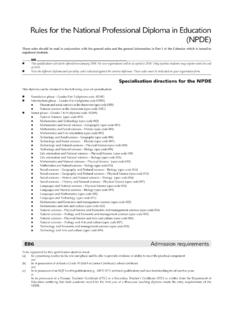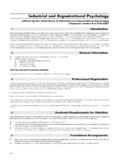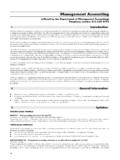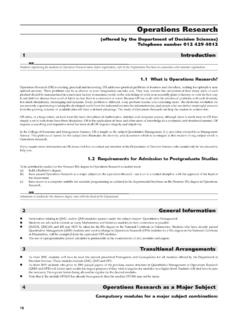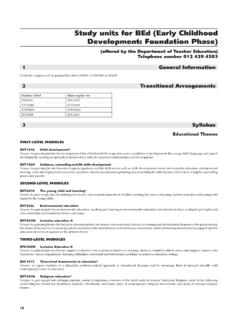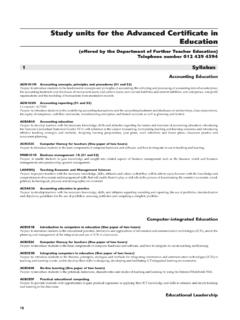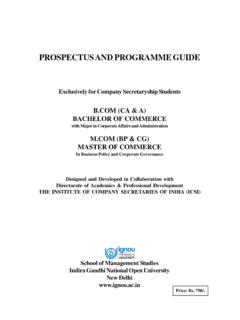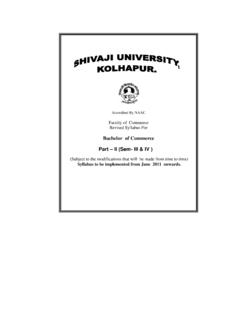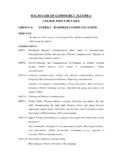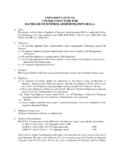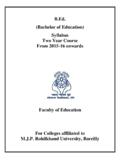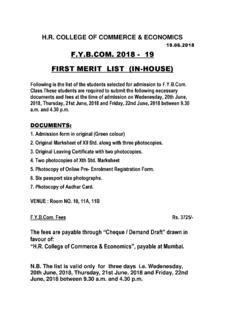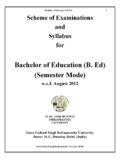Transcription of Rules for the Degree of Bachelor of Commerce
1 Rules for the Degree of Bachelor of Commerce ( Degree code: 02011)These Rules should be read in conjunction with the general Rules and the general information in Part 1 of the Calendar which is issued to registered Reference to courses I, II and/or III includes the equivalent in modules. Course I in a subject is equivalent to two modules on fi rst level, Course II is equivalent to two modules on second level and Course III is equivalent to fi ve modules on third level. A student who has completed a BCompt, BBA, BAdmin or a BCom Degree with specialisation in a specifi c direction may not repeat or register for a Degree which has already been conferred.
2 However, he/she may register for another Degree , or in the case of a BCom Degree register for another BCom specialisation Degree provided that at least half of the number of study units were not passed for the previous Degree , that none (see exception below) of the compulsory third-level modules were passed for the previous Degree , and ten third-level modules, which includes one major subject must be passed at Unisa. This is also applicable in the case of degrees and diplomas obtained from any other recognised University, Technikon or : A student who completed a Bachelor s Degree with specialisation in Business Management, may register for the BBA, BBanking or a BCom Degree with specialisation in either one of Entrepreneurship, Financial Management, Human Recource Management, Management, Management Accounting, Marketing Management, Retail Management, Risk Management or Strategic Supply Management provided that at least half of the study units were not passed for the previous Degree .
3 And that not more than two of the compulsory modules on third-level which are off ered by the Department of Business Management and Entrepreneurship is being repeated. GRADUATES wishing to register for the Honours BCom, BCompt or BAdmin Degree in a subject in which they have not yet passed Course III, may normally qualify for admission to studies for the Honours Degree by registering for and passing the prescribed modules on fi rst, second and third level (where applicable) in the subject concerned for non- Degree purposes (NDP). In particular cases, passes in modules in one or more other subjects may also be required.
4 Any restrictions listed under a study unit also apply to registrations for NDP. See also the exception in General Rule G19 in Part 1 of the Calendar. Although examinations for modules may be arranged for both semesters, students must note that tuition in semester modules is not necessarily off ered in both semesters. Modules which are off ered in the fi rst semester are indicated as (S1) aft er the respective module under the syllabus. Modules off ered in the second semester are indicated as (S2). Students registering for semester modules MUST consult the Information Brochure in connection with semester AdmissionTo be registered as a candidate for the BCom Degree a student must have satisfi ed the provisions of Rule G13 in Part 1 of the specialisation in: Economics Financial Management Logistics Tourism Management Transport EconomicsNSC achievement rating of at least 4 (50-59%) for language of tuition and NSC achievement rating of at least 3 (40-49%) for Mathematics or 6 (70-79%) for Mathematical LiteracyFor specialisation in.
5 Decision Sciences Quantitative Management StatisticsNSC achievement rating of at least 4 (50-59%) for language of tuition if home language or at least 5 (60-69%) for language of tuition if fi rst additional language and NSC achievement rating of at least 4 (50-59%) for Mathematics or 7 (80-89%) for Mathematical LiteracyFor specialisation in: Entrepreneurship Financial Accounting Human Resource Management Industrial and Organisational Psychology Internal Auditing Management Management Accounting Marketing Management Strategic Supply Management TaxationNSC achievement rating of at least 4 (50-59%) for language of Duration of study and number of study units per year(1) The BCom Degree cannot be completed in under THREE YEARS.
6 (2) ON FIRST REGISTRATION AND ON RE-ENROLMENT at this University the number of study units for which a student may register is determined by Number of study units per year in Section D3 in Part 1 of the Calendar(3) Refer to Section D3 Number of study units per year in Part 1 of the Calendar for the number of study units a student may register for per Subjects The curriculum for the BCom Degree comprises 32 (except for Management Accounting and Internal Auditing. See Rule C6n) modules in subjects to be selected from Groups A and B below. A student may replace a lower level module with a higher level module provided that such module may be included in the curriculum, and that the prerequisites are met.
7 For students who may complete the curriculum without Introduction to the Economic and Management Environment refer to this subject chapter in Part 2 of the Calendar, the curriculum comprises 30 modules in subjects to be selected from Groups A and B lett er M indicates that the subject may be selected as a codes for the various modules will be found under the relevant syllabus in Part 2 of the A: Subjects offered by the College of Economic and Management Sciences (M = major)M AccountingM Industrial and Organisational PsychologyAccounting Data ProcessingIntroduction to the Economic and Management EnvironmentM LogisticsM AuditingM Management AccountingM Internal AuditingM Public Administration (only for the general BCom Degree )M Business ManagementM Quantitative ManagementEconomic HistoryTaxationM Statistics (off ered by CSET)M EconomicsM Tourism TransportM Financial AccountingM Transport EconomicsGROUP B.
8 Subjects offered by other CollegesAny language (one or two modules on fi rst level only)Labour LawCommercial LawBusiness Ethics (PLS3701)Information SystemsStatisticsC6n Composition of the curriculumWith the exception of the BCom (with specialisation in Management Accounting) and (with specialisation in Internal Auditing) which comprise 34 modules, the general Degree and all other specialisation degrees comprise 32 BCom Degree (02011 GE1)This is a general Degree and is known as the BCom Degree . The curriculum is as follows:FIRST LEVELThis level comprises 12 modules, the following 8 of which are compulsory:NBINM1013 and INM1024 are compulsory for fi rst registration.
9 Refer to General Information under the subject Introduction to the Economic and Management Environment in Part 2 of the Calendar for students exempted from these : Introduction to the economic and management environment 1A (Introduction to the Economic and Management Environment 1013)INM1024 : Introduction to the economic and management environment 1B (Introduction to the Economic and Management Environment 1024)ECS1016 : Economics 101 (Economics 1016)ECS1028 : Economics 102 (Economics 1028)MNB101D : Business management 101(Business Management 101)MNB102E : Business management 102 (Business Management 102)FAC1502 : Accounting concepts, principles and procedures (Accounting 1502)FAC1601 : Accounting reporting (Accounting 1601)plus any 4 fi rst-level modules in subjects listed in groups A and B under C5(n).
10 SECOND LEVELThis level comprises 10 modules, the following 4 of which are compulsory:MNG2016 : General management (Business Management 2016)ECS201A : Microeconomics (Economics 201)ECS202B : Macroeconomics (Economics 202)and at least 1 of the following:MNH202C : Human resources management (Business Manage-ment 202)MNF2023 : Financial management (Business Management 2023)plus any 6 second-level modules in subjects listed in Group A under C5(n) or from the remaining second-level optional modules not yet selected or a combination LEVELThis level comprises 10 modules which must include:5 modules (1 major subject) in a subject from Group A and any 5 third-level modules in subjects from groups A which have not been taken previously.

